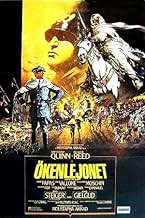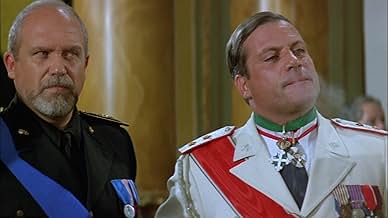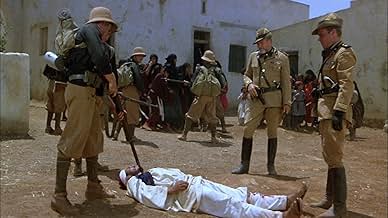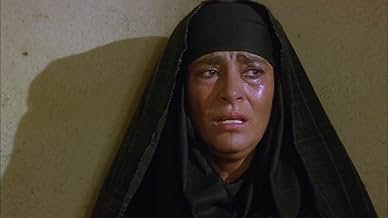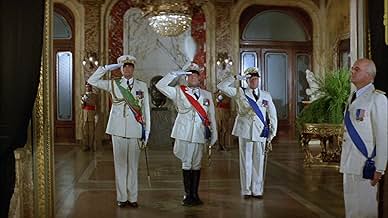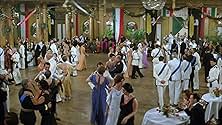In 1929, Italian Fascist dictator Benito Mussolini appoints General Rodolfo Graziani as colonial governor to Italian Libya with orders to stamp-out all resistance from Libyan nationalists le... Read allIn 1929, Italian Fascist dictator Benito Mussolini appoints General Rodolfo Graziani as colonial governor to Italian Libya with orders to stamp-out all resistance from Libyan nationalists led by rebel guerrilla leader Omar Mukhtar.In 1929, Italian Fascist dictator Benito Mussolini appoints General Rodolfo Graziani as colonial governor to Italian Libya with orders to stamp-out all resistance from Libyan nationalists led by rebel guerrilla leader Omar Mukhtar.
- Prince Amadeo
- (as Sky Dumont)
- Director
- Writers
- All cast & crew
- Production, box office & more at IMDbPro
Storyline
Did you know
- TriviaThe production's obsession with authenticity extended right down to the same barber who used to shave Benito Mussolini's head being hired to shave Rod Steiger's, the actor who played him.
- GoofsMussolini is talking to Graziani in the opening when he looks the map of Libya, and says that all the green land is for Italy, but this is a topographical map that shows land greener as it becomes lower by sea level. Ninety percent of the area of Libya is desert.
- Quotes
Omar Mukhtar: We will never surrender. We win or we die. And don't think it stops there. You will have the next generation to fight; and after the next, the next. As for me, I will live longer than my hangman.
- Alternate versionsThe U.S.A. Home Video VHS release in the '80s runs 160 minutes. Footage has been added in the Director's Cut released on Anchor Bay Video. This version, released in 1998, runs 206 minutes.
The Arab-American Moustapha Akkad produced and directed the film in Libya with Gaddafi's full support. The film is reasonably accurate and, in my opinion, fair and balanced. Anthony Quinn had a long and distinguished career playing 'ethnic types' and his portrayal of Omar Mukhtar is undoubtedly one of his finest performances. Omar in the film is probably much more of an action man than the real Mukhtar who was more of a strategist than a fighter. Or so I was informed whilst on holiday in Tunisia. The film is (understandably) one of the most famous in the Arab world, dealing as it does with Arab suffering under recent European colonialism.
Akkad uses original black and white archive film to underpin its historical authenticity. At the start to set the scene of the Italian conquest of Libya from Turkey in 1911. In the middle to show an aerial view of the concentration camps built by the Italians and also the barbed wire 'Hadrian's Wall' built along the Egyptian border. Both these strategies were intended to cut off Mukhtar from his supply sources. At the end of the film there are still photos of the real Mukhtar in chains and also of the main Italian protagonists we see in the film.
Rod Steiger blusters through his role as Mussolini, the fascist dictator who wants to send Italian colonists to a peaceful Libya, an ambition being thwarted by Omar Mukhtar's stubborn 20-year long armed resistance. Oliver Reed plays a suitably ruthless General Graziani, the man charged with crushing Mukhtar. But his character is no two-dimensional brute.There is a very engaging private dialogue between himself and the captive Mukhtar. The two men debate historic claims to Libyan soil, with Graziani pointing out that the Romans were there before the Arabs. Reed gives a very controlled performance, one of his best.
The film is very balanced in its portrayal of the Italians. On the one hand we see some terrible reprisals-shootings and hangings-against civilians. On the other hand we have two sympathetic Italian officers whose conscience is afflicted by by the war they are forced to wage. The Raf Vallone character is particularly sympathetic- very courteous, generous and kind to the captive Mukhtar. This is history telling at its best. Italian fascists were not all the same. Individuals matter. Likewise, the Italian officer chosen to defend Omar at his trial argues that Mukhtar never committed treason against the Italian state because he never accepted it rule.
On the Arab side we have John Gielgud playing the high-ranking Sharif el-Gariani character who is sent to ask Omar to end his struggle. Some Arabs were willing to collaborate with an Italian rule which was helping to modernise their country. There is a nice reference to the fact that 'the League of Nations will not help you', highlighting the limitations of this predecessor of the UN. Come to think of it, things have not changed very much!
The action scenes are spectacular, with some inspiring ambushes by the insurgents against the Italian forces. The film credits Graziani (wrongly?) with being the first general to bring tanks into the desert. The Italian assault on the oasis town of Kufra is a theatrical masterpiece. Some viewers may think that all this is probably a bit over the top. It probably is but it certainly boosts the film's entertainment level. In fact, the film could have shown Italian planes dropping poison gas bombs as they did in Abyssinia a few years later. In his biography of Mussolini, the eminent historian Denis Mack Smith maintains that this did happen in Libya.
The music is very effective and the film is emotionally charged throughout, especially during the hanging scenes. The Omar Mukhtar character is accorded a great deal of dignity and honour. The film is hagiography but so are 'Spartacus', 'Ben-Hur', 'El Cid' and scores of other epics. Does this make the film a piece of Arab propaganda? Yes and no. The film emphasises the central role of Islam in giving Omar the inner strength to continue his fight. It tells an historical tale with a great deal of accuracy but it is also a feature film which aims to entertain. In that respect it is no different to any Hollywood blockbuster about the Alamo or Pearl Harbor. In my opinion it is superior to many such blockbusters. It's just that white Caucasians have to get used to being the bad guys for a change.
Gaddafi is now coming in from the cold and opening up his country to tourism. I can only hope that this will result in the film becoming more widely available and better-known in the UK. 'Lion of the Desert' is an excellent historical epic which tells one side of the story. Some historians would argue that Mukhtar's defeat and death paved the way for the enlightened rule of Italo Balbo who governed a 'pacified' Libya after 1934 with few executions and much building of infrastructure. I would not accept this view as all imperialisms are self-justifying and ultimately unacceptable.
- max-vernon
- Apr 12, 2005
- Permalink
- How long is Lion of the Desert?Powered by Alexa
Details
- Release date
- Countries of origin
- Languages
- Also known as
- Omar Mukhtar - Löwe der Wüste
- Filming locations
- Production company
- See more company credits at IMDbPro
Box office
- Budget
- $35,000,000 (estimated)
- Runtime2 hours 53 minutes
- Color
- Sound mix
- Aspect ratio
- 2.35 : 1
Contribute to this page



